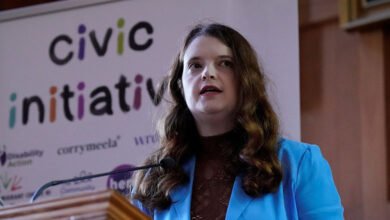TRADE UNION DESK: What the right gets wrong on immigration

A mob chanting ‘send them back’ is not up for a ‘balanced discussion’, writes the ICTU’s John O’Farrell.
It has been a staple of right-wing commentary that: “We have not openly debated immigration and integration in the UK”, to cite a recent offender. In fact, since Enoch Powell made his revolting ‘rivers of blood’ speech in 1968, with its lies about a white woman in his constituency having excrement pushed through her door and harassed – a woman no journalist could ever find – we have had:
- marches across the streets of British cities;
- the rise and fall of openly fascist parties from the National Front to the BNP to Britain First;
- a series of laws passed restricting immigration;
- mainstream politicians playing footsie like Margaret Thatcher “feeling swamped”;
- a series of hard-right parties between the mainstream and the extreme right; and
- the weaponisation of migration to successfully campaign for Brexit.
We have also had the normalisation of migrants being scapegoated by national newspapers for the consequences of policies which those newspapers championed, and their impact on the availability of housing, jobs and, public services, and the wider economic policies which deindustrialised swathes of regional cities, while rebalancing the national wealth to south-east England and financial services.
Add to that the spread of unregulated social media like wildfire through the laptops and smartphones of people who are open to messages of easy blame and easier solutions, and we find ourselves facing millions of people believing that Covid was a hoax and that 5G and vaccinations are part of the same pernicious plot as ‘the Great Replacement Theory’.
“It is entirely fine to label as racist, thugs who threaten and attack mosques or businesses based on the ethnicity of their owners.”
John O’Farrell
Which is why the UK’s ‘debate on immigration’ has consisted of Suella Braverman MP chirping about an ‘invasion’ by shivering refugees in dinghies, and that the only possible ‘solution’ is a multi-billion pound exercise in performative cruelty – like deporting a few asylum seekers to Rwanda.
On top of that is the strange spectacle of some of the poshest members of the commentariat opining that it is unfair to label working class people as racist if they have ‘legitimate concerns’.
Firstly, it is entirely fine to label as racist, thugs who threaten and attack mosques or businesses based on the ethnicity of their owners.
Secondly, who is saying that these thugs are working class? As the historian David Olusoga noted: “To put the violence directed at British Muslims, Black Britons and asylum seeking down to ‘legitimate grievances’ is to fall for one of the most toxic and intentionally divisive falsehoods in the populist handbook: the myth that class and race are diametrically opposed, the assertion that non-white people have no class identity. In this distorted world view, the true working class are the “white working class”, and the difficulties they face are not a consequences of political choices that affect everyone, irrespective of ethnicity, skin colour or faith, but of ‘elites’ putting the needs of minority communities first. As if those minorities are not themselves working class.”
An additional piece of misdirection is the temptation by editors to find a balanced way of telling the story. This leads to a ‘both sides’ approach which legitimises as equally valid a point of view that there are people who wish to live equally in a shared society and those who think that those people should cease to exist, by violence or forced exit. A mob chanting ‘send them back’ is not up for a ‘balanced discussion’.
For decades, trade unions have been in those discussions, and shop stewards are trained to peacefully resolving racial, ethnic, or sectarian disputes in working class environments, often at personal risk.
In 2017, ICTU and the CBI committed to eliminating racism and discrimination in our workplaces and developed the updated Joint Declaration for Dignity at Work and Inclusive Working Environments, an initiative fostered by the LRA’s Employment Relations Roundtable, to promote a culture:
- giving all persons an equal opportunity for employment and advancement irrespective of religious belief, political opinion, racial group, age, marital status, sexual orientation, sex, disability, and persons with or without dependants;
- encouraging all employees to develop their full potential;
- rewarding achievement;
- where the employer is working to maintain and/or ensure fair participation in its recruitment and employment thus achieving a workforce that is broadly representative of the Northern Ireland community; and
- and respecting expressions of diverse identity in the context of a harmonious and inclusive working environment.





